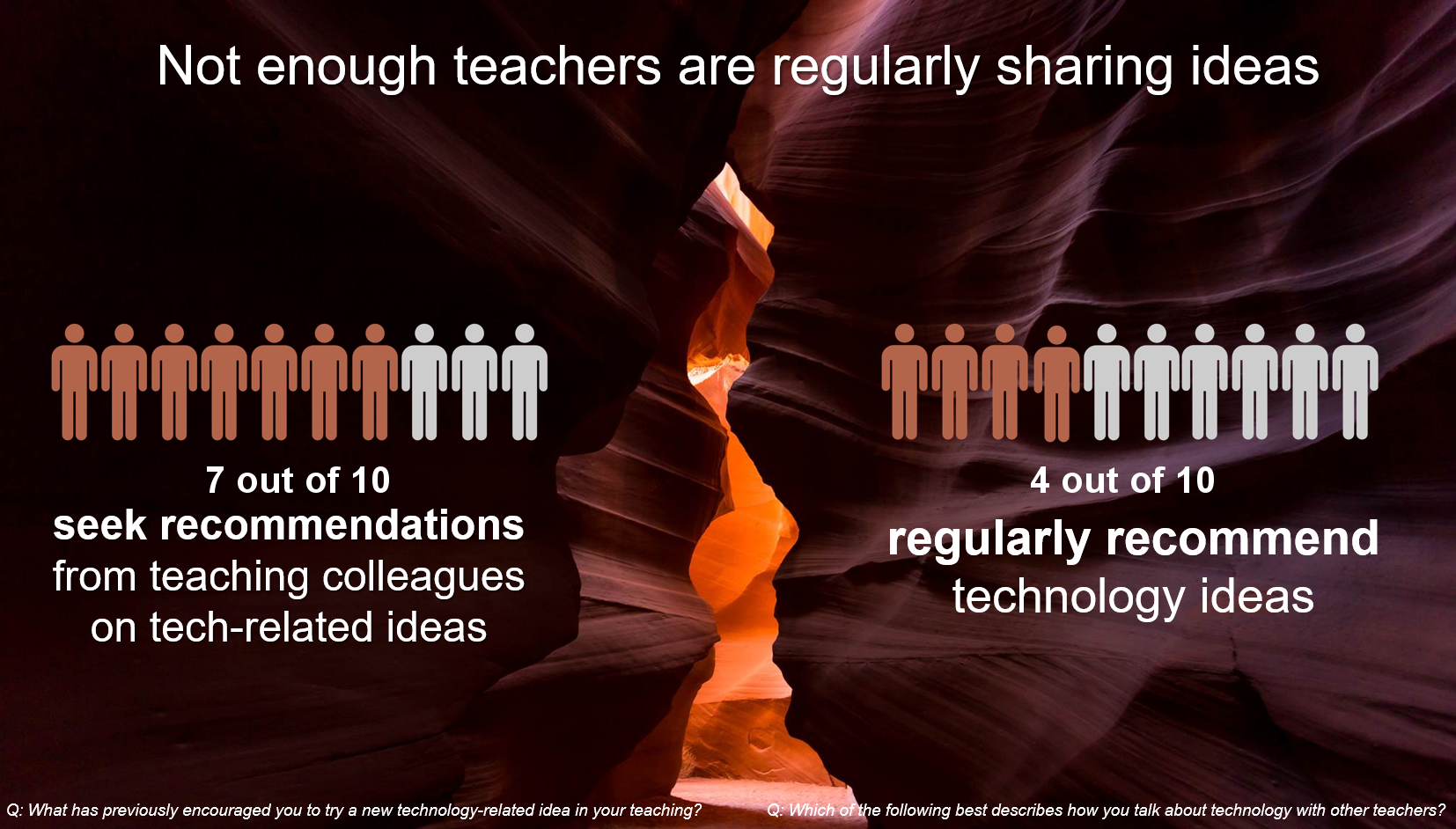Bridging the ‘sharing gap’: Networks and social learning

What did you do the last time you had a tricky problem to solve, or needed fresh inspiration to move an idea along? Did you shut the door, turn the phone off and keep plugging away until the magical breakthrough came? Or did you reach out to someone sitting next to you, email a colleague or post an open shout-out on a social forum?
The ‘sharing gap’
We already know how much teachers value their peers, and the most recent Navitas Teacher Technology Survey underlined it again. 70% of our teachers look to recommendations from colleagues to try a new tech-related idea, and 59% look for examples in a familiar context before taking the leap. However, when it comes to actively sharing or recommending ideas, only about 40% of teaching staff seem comfortable to regularly do this.

What makes sharing so challenging?
Beyond the numbers, years of honest conversations with teaching staff tell a more nuanced story. With a global community such as ours, shifting timetables and multiple timezones can make it hard to coordinate spontaneous or scheduled opportunities to share practice. It can also be hard to find the right kinds of engaging and supportive ‘spaces’ to enable effective sharing, whether physically in staffrooms or virtually in online communities.
The biggest challenge, however, is when people doubt the value of their own ideas and experience. A great piece of research or practice can be so familiar to an individual that they no longer see it as unique or valuable (‘What would anyone learn from me?’). In these circumstances, having the right mechanisms, structures and culture in place means these ideas are more easily surfaced and shared through regular connection points.
Network theories and social learning: a taster
With the phenomenal growth of social media, it can seem like everyone is an expert on networks and communities these days. Take a little time to get beyond the hype, however, and there are some fascinating perspectives on social learning which can offer inspiration, principles and frameworks we can adapt to put theory into practice.
Here are just a handful of interesting individuals who have shared diverse perspectives on the practical use of well-connected communities:
- George Siemens (@gsiemens) – Whilst Siemens’ publications on ‘connectivism’ are already over 10 years old, there are many highly relevant ideas to re-visit in this context. Siemens notes that learning occurs in complex, chaotic, shifting spaces and knowledge is networked, distributed and increasingly aided by technology. The experience of learning forms new neural, conceptual and external networks.
- Anthony Bryk – Bryk’s work with the Carnegie Foundation on ‘Networked Improvement Communities’ looks at new ways to approach complex challenges in education. The concept brings together threads from Improvement Science, Design Thinking and the power of networks to tackle difficult issues in rigorous, practical and innovative ways.
- Max McKeown (@MaxMcKeown) – Moving across to strategy and innovation, McKeown looks at how innovation comes from the creative use of many different types of networks. Our strongest connections offer us smooth working relations, emotional commitment and deep, shared knowledge, but ‘weak’ connections are also important, increasing the chance of sharing information and perspectives which may be old to one individual, but new to many others. If you’re familiar with Granovetter’s ‘Strength of Weak Ties’ theories, there are certainly echoes here.
- Rachel Happe (@rhappe) – Finally, the co-founder of the Community Roundtable shares lots of practical advice on running effective and engaged communities, including structures for evaluating the long-term evolution of communities: https://communityroundtable.com/what-we-do/training-and-events/toolkits
Hear more about the theory and practice of social learning and communities in this webinar recording and keep an eye out for more examples of networks and communities in action on this website.
If you already have a learning and teaching project, practice, research or other initiative that you’re ready to share, get in touch and be part of the global L&T community at Navitas!
